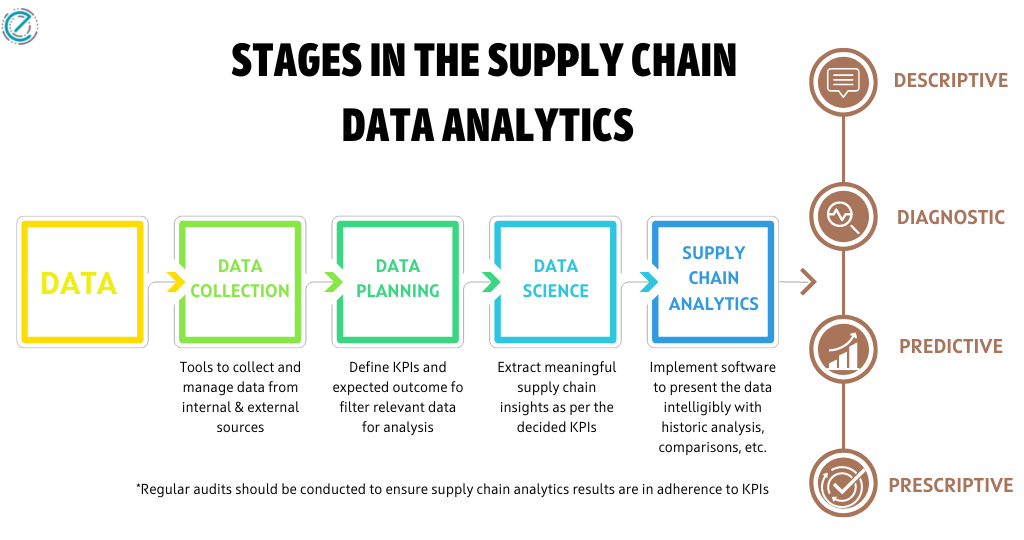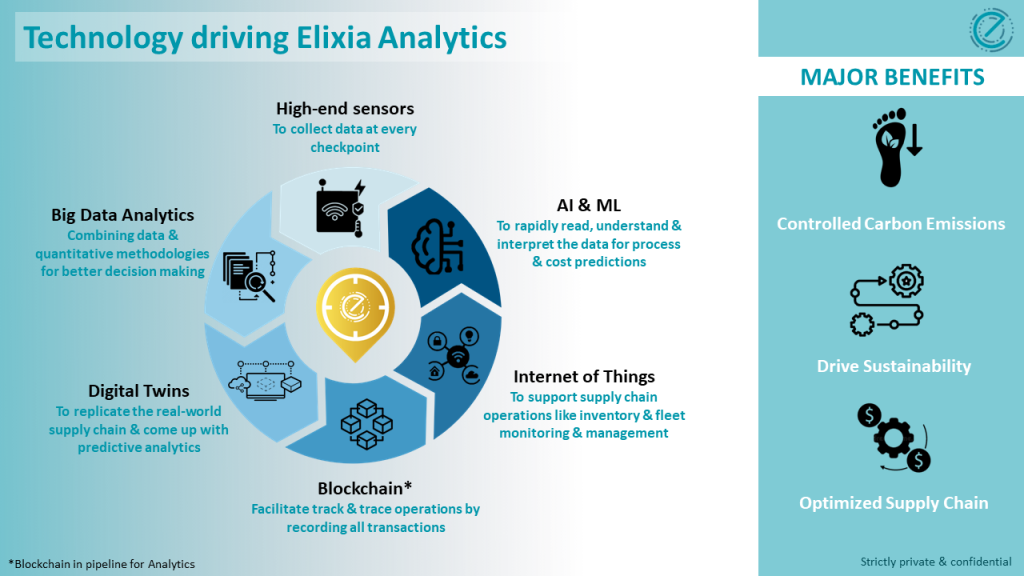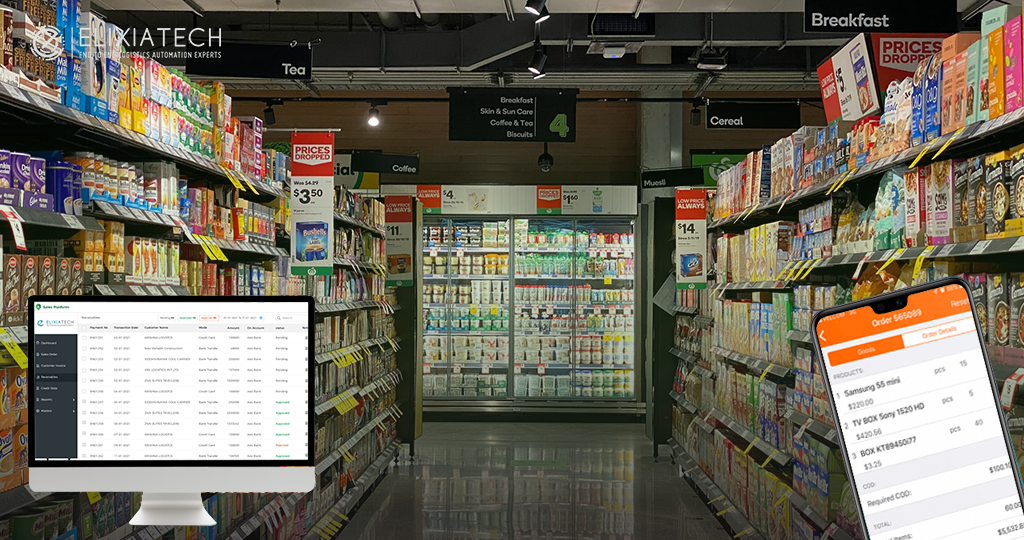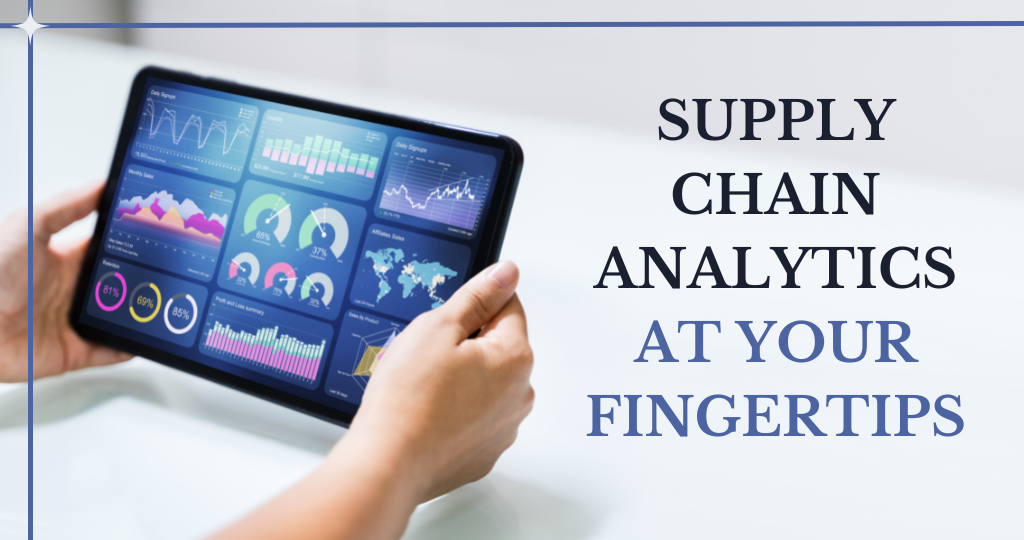
All about Supply Chain Analytics
Supply chain analytics in layman’s terms is a simplified & organized visual version of supply chain data in tables, charts, graphs, etc. But in reality, it is much more than this. Supply chain analytics is a technology-driven methodology that collects and categorizes data to generate meaningful insights for the supply chain. From the supply chain perspective, this analysis helps in a better understanding of the processes, vendor performance, KPI adherence, cost compliance, and other related parameters.
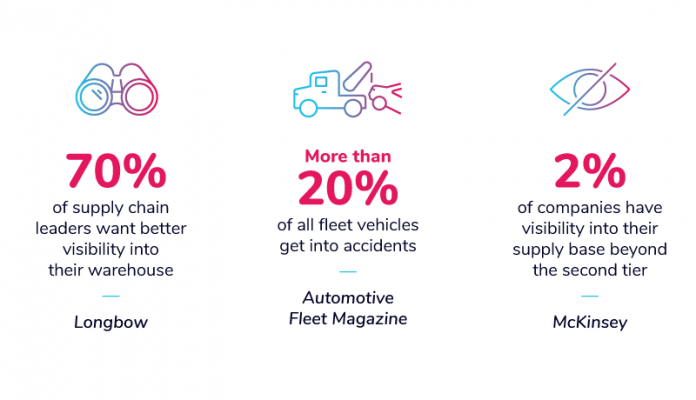
Types of Supply chain analytics with examples
The term “supply chain analytics” is vast and can be categorized based on the type of insights or outcomes of the analytics process. Starting with Descriptive analytics, as the name suggests is an outcome that describes the scenario and gives an idea of the current situation. Next, Diagnostic analytics describes and shares diagnosis i.e. the possible reason behind the occurrence of a situation. Predictive analytics then is all about using technologies like AI, ML, etc to analyze the supply chain data and give calculated predictions. And finally, Prescriptive analytics works towards identifying alternate scenarios and finally suggesting the most optimal outcome.
Understanding types of Supply Chain Analytics with examples
Consider a report from supply chain analytics on the delivery performance in the month of Feb’23. The interpretations from the reports are as follows:
- The on-time, in-full (OTIF) delivery score has gone down by 5% (80 to 76)
- The OTIF score for the next month is expected to be 76
- Out of transporters “B” & “C” on Mumbai – Pune route, select “C” as his price is within the budget
- The transporter “A” on Mumbai – Pune route has accepted only 5 deliveries, out of 15 allotted to him
Now, check your understanding and categorize the following outcomes as descriptive, diagnostic, predictive, and prescriptive.
(Answers are shared at the bottom. Please note this is just a basic example to get an understanding of outcomes from Analytics.)
How to implement analytics in your supply chain?
We now understand what supply chain analytics does and the kind of outcomes that result from implementing an analytics solution. But what goes behind driving this analytics model? What needs to be in place to get correct and logical outcomes? It’s data!
Supply chain data is the building block of its analytics module. Today’s vastly spread supply chain involves various departments, functions, and external vendors. All of these handle their data using their own tools & methods. Thus, the first step is to bring uniformity to the data collection process and then integrate and save it in the same format, on one single platform. This data should be accurate, latest, and free of duplicity so that the ultimate outputs are relevant to the supply chain scenario.
The next step is to apply data science to extract meaningful insights from the collected set of data. This approach utilizes maths, statistics, algorithms, and advanced technologies like Artificial intelligence & Machine learning, to interpret and analyze the data and generate outcomes that help in improving supply chain performance.
And the final step, supply chain analytics presents you with a clear picture of the selected data and insights that are relevant to your business. It filters out irrelevant data and provides information right to the point. This enables faster and more intelligent business decisions. Users can customize the final outcome to view relevant reports and dashboards, providing a coherent overview of the supply chain KPIs and performance.
Key Benefits of Supply Chain Analytics
A lot of hard work goes behind planning and implementing supply chain data analytics. Hence, it’s justified to understand the benefits it can bring to the business. Apart from the customized KPI/ goal achievements, there are a few apparent benefits that are applicable to all supply chains.
(i) Supply chain transparency
Supply chains are complex processes that constantly work from acquiring the raw materials to the dispatch of the finished product. This process involves interacting with various components like warehousing, manufacturing, transportation, distribution, etc. to successfully achieve the end goal. Analytics then aggregates data from all parts of the supply chain to derive cohesive value, promoting transparency and trust among departments.
(ii) Process optimization & efficiency
Supply chain analytics constantly collects and analyzes the data from the processes in real-time and provides instant updates and reporting. This helps in identifying the low-performing areas, checking for the possible source of deviation, and taking instant corrective action. In conclusion, supply chain analytics can suggest the most optimized and cost-effective way to complete an operation, even when the process is within defined parameters.
(iii) Logistics cost savings
The whole process of the supply chain incurs a number of large and small expenses. Thus, unrecorded, unaccounted, or unpaid spending may cause financial and emotional losses to shippers, vendors, drivers, and others involved. With supply chain analytics, users can declare budgets, operational costs, and miscellaneous expenses, while also monitoring spending to prevent cost slippage. Recording, analyzing, and taking care of these avoidable expenses such as fines due to delayed deliveries or late payments can prevent unnecessary fees in the future.
(iv) Stronger, resilient supply chains
Identifying and understanding the supply chains is the first step toward building strength and resiliency. Analytics finally gives you the control and authority to understand the strengths and weaknesses of your supply chain. Immediate improvement measures can help in reducing any operational and cost slippage. Thus, building stronger, sustainable, and future-ready supply chains.
Elixia’s Supply Chain Analytics Software
Elixia Analytics software is a one-stop solution that provides a panoramic view of supply chain expenses, budgets, and operational performance. It identifies the gaps in operational efficiencies of overall supply chain processes and provides intuitive reports, analytics & dashboards to get insightful information on all supply chain processes.
The logistics tech, SaaS-based company Elixia Inc provides intelligent solutions to digitalize, automate, and improvise logistics and supply chain processes. Our software integrates with legacy systems, vendors, and third-party solutions, providing analytical insights for informed business decisions.
Want to experience the power of Supply Chain Analytics?
Schedule a call with us now!
